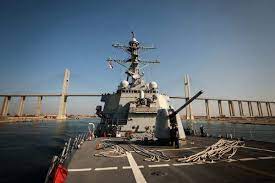The Biden administration’s decision to withdraw the USS Ford Carrier Strike Group from the Middle East, despite earlier claims of its vital role in bolstering deterrence efforts, raises questions and concerns. Here’s a breakdown of the situation:

As tensions rise, the US removes the USS Ford Carrier Strike Group from the Middle East.
Deployment for Deterrence
When initially deployed to the Eastern Mediterranean Sea in response to Hamas’ attacks against Israel, the USS Ford Carrier Strike Group was positioned as a crucial element in deterring wider conflicts, particularly against Hezbollah in Lebanon and other Iran-backed proxy groups in the region. The move aimed to send a strong message, ensuring regional stability and emphasizing the commitment to protecting national security interests.
Changing Dynamics
Recent tensions, including the Israeli strike that killed a Hamas leader in Lebanon, have heightened the risks of potential retaliatory strikes by Hezbollah or other Iranian proxies. The decision to withdraw the USS Ford Carrier Strike Group comes at a time when the situation in the region remains delicate, prompting questions about the evolving dynamics and the reasoning behind this shift in military presence.
Replacement with Bataan Amphibious-Ready Group
The USS Ford Carrier Strike Group will be replaced by the Bataan Amphibious-Ready Group, a significantly smaller force focused on capabilities for evacuations and humanitarian assistance rather than the robust retaliatory strikes that the USS Ford could execute. This shift in deployment capabilities raises eyebrows, as defense officials haven’t provided clarity on why such a change is deemed appropriate.
Expert Perspectives
Former Pentagon official Alex Plitsas expresses perplexity over the decision, emphasizing that if the USS Ford Carrier Strike Group was initially deployed for deterrence, its return home suggests either the deterrence has been established or the situation remains unclear. The recent strike in Lebanon has added complexity to the regional landscape, increasing the potential for Hezbollah-initiated conflicts and further escalation.
Uncertain Future
As the USS Ford Carrier Strike Group exits the Middle East, questions linger about the potential consequences of this decision. The shift to a smaller force with different capabilities adds uncertainty to the ability to respond effectively to evolving threats in the region. Observers will closely monitor how this change impacts the delicate geopolitical balance and the Biden administration’s overall approach to the Middle East.
In conclusion, the withdrawal of the USS Ford Carrier Strike Group raises concerns about the evolving situation in the Middle East, leaving experts and observers questioning the reasoning behind this strategic shift and its potential implications for regional stability and security.
Read Also – Alert: New Tax Credit: Up to $3,000 Could Be Received by Hundreds of Americans for Caregiving
















